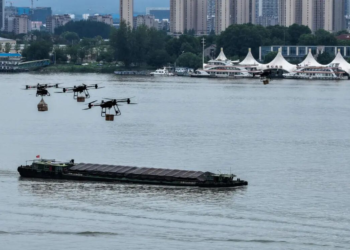Introduction: New Rules for Air Travel Electronics in China
In a significant move aimed at bolstering aviation safety, Chinese authorities have announced a nationwide ban on uncertified power banks and portable battery packs aboard domestic flights. The Civil Aviation Administration of China (CAAC) made the announcement following a surge in incidents involving overheating lithium batteries, some of which have caused in-flight fire hazards.
The new regulation, which came into effect immediately, bars passengers from carrying power banks that are not certified under China’s Compulsory Certification (3C) program, a move that authorities hope will mitigate the risk posed by defective or counterfeit electronic devices.
What Is the China Compulsory Certification (3C) System?
The 3C certification, officially known as China Compulsory Certification, is a mandatory safety mark for many products imported, sold, or used in the Chinese market. It is similar to the CE marking in the European Union and ensures that products meet strict quality and safety standards.
In the context of air travel, the CAAC has now made it mandatory that all power banks carried on flights must display a valid 3C mark, which signifies that the device has been tested and approved for use under Chinese safety regulations. Any power bank:
- Without a visible 3C label,
- With ambiguous or unclear labeling,
- Or listed in recent product recalls,
will now be prohibited from being carried aboard airplanes.
Why the Ban? Rising Safety Concerns Over Lithium Battery Devices
A Surge in Battery-Related Fires
The CAAC’s decision is rooted in an increasing number of reported incidents involving lithium battery-powered devices. These include smartphones, laptops, and portable chargers, which are popular among frequent travelers.
Over the past year, Chinese airlines have documented multiple instances where power banks caught fire mid-flight or while charging at airport terminals. While many incidents were brought under control without casualties, the rising frequency has triggered widespread alarm in the aviation and regulatory community.
Specific Incidents Leading to the Ban
Two major product recalls in June 2024 have been cited as key reasons behind the decision:
1. Recall of 492,000 Units of Romoss Power Banks
Shenzhen-based company Romoss, a well-known brand in China’s electronics sector, was ordered by authorities to recall nearly half a million units of its 20,000mAh power banks. The models in question were manufactured between June 2023 and July 2024.
Several Chinese universities had reported fire hazards when these units overheated during charging or transport. Investigations revealed flaws in the battery management system and thermal regulation components, leading to overheating under stress conditions.
2. Global Recall by Anker Innovations
On June 20, 2024, Anker Innovations, a globally recognized electronics brand, announced a voluntary recall of 710,000 units of its power banks sold internationally. The recall cited a manufacturing defect involving battery cell materials, which posed a potential fire hazard.
Although only a few incidents were reported, Anker said it initiated the recall out of an abundance of caution, emphasizing its commitment to consumer safety. Many of these devices were being used by travelers across Asia, Europe, and North America, increasing the urgency for aviation regulators to take preventive steps.
How Will the New Ban Affect Airline Passengers?
Impact on Travelers and Airlines
The CAAC has directed airlines and airport security personnel to strictly enforce the ban at all security checkpoints. This includes:
- Inspection of power banks for the 3C certification mark.
- Denial of boarding for passengers carrying unlabeled or recalled models.
- Confiscation of non-compliant devices at the gate or during boarding.
This rule applies only to domestic flights within China, but industry experts believe international carriers flying into or out of China may also begin to adopt similar policies in cooperation with international aviation safety agencies.
Penalties for Non-Compliance
Passengers found carrying non-certified or dangerous power banks may face:
- Confiscation of the device.
- Fines or warnings under aviation safety laws.
- Denial of boarding in extreme cases where a risk to passenger safety is evident.
What Devices Are Considered Safe for Travel?
To remain compliant with the new policy, travelers should ensure:
- Their power bank is clearly marked with the 3C logo.
- The capacity of the device does not exceed 100Wh, as per CAAC guidelines.
- The device has no visible damage, such as swelling, broken casing, or exposed wiring.
- Devices must be carried in hand luggage, not checked baggage.
Recommended Practices for Passengers
- Purchase power banks from reputable vendors.
- Keep original packaging or proof of purchase showing compliance with safety standards.
- Avoid using or charging devices in-flight unless permitted by the airline crew.
- Regularly inspect devices for any signs of damage or overheating.
Industry Reactions and Consumer Feedback
Aviation Experts Support the Move
Aviation safety specialists have welcomed the CAAC’s decision, stating that proactive regulations are essential in light of the increasing reliance on personal electronic devices during travel.
Zhou Ping, an aviation analyst at China Aviation News, said, “This is a timely step to protect passengers and crew. The growing use of portable chargers has not been matched with adequate regulatory checks until now.”
Mixed Reactions from Passengers
While some passengers appreciate the increased emphasis on safety, others have expressed frustration over not being able to use their current devices, particularly those who had recently purchased imported brands not registered under the 3C program.
On social media platforms like Weibo and WeChat, users have urged the government to publish a public list of approved devices, to help consumers make informed choices.
Implications for International Aviation and Manufacturers
The CAAC’s announcement could have global ramifications. With China being a major aviation hub and manufacturing base for electronics, experts predict that:
- Other countries may adopt similar standards, particularly in Asia-Pacific.
- Manufacturers will be pressured to obtain 3C certification even for products intended for export.
- There will be increased scrutiny on lithium battery production and testing.
Brands that fail to meet the standards risk losing access to the Chinese market and may suffer reputational damage globally.
Conclusion: Prioritizing Safety in an Era of Connectivity
The Chinese government’s decision to ban uncertified power banks on domestic flights underscores the growing tension between technological convenience and passenger safety. As power banks become a travel essential, ensuring their safe use aboard airplanes is critical.
Passengers are encouraged to stay informed about aviation safety rules, buy from trusted manufacturers, and always travel with approved and certified devices. Meanwhile, this regulatory development sends a clear message: in-flight safety will not be compromised for convenience.

























